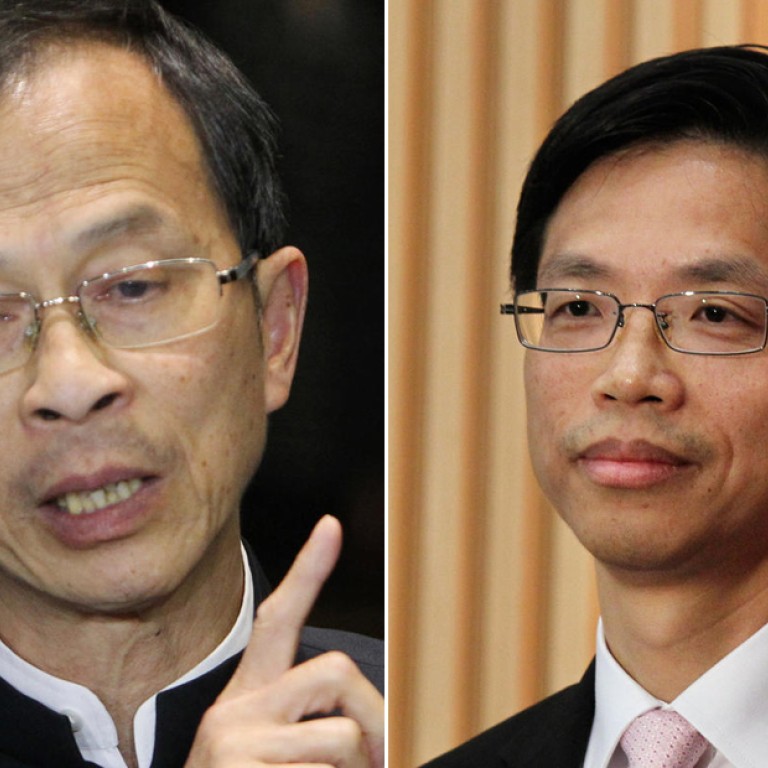
Government officials told to raise their profiles after Legco chief can't identify undersecretary
Government officials need to raise their profiles, lawmakers said, after the Legislative Council president was left stumped by the identity of the administration's representative at a meeting.
Government officials need to raise their profiles, lawmakers said, after the Legislative Council president was left stumped by the identity of the administration's representative at a meeting.
Their comments came as Legco chief Jasper Tsang Yok-sing apologised yesterday for failing to identify undersecretary for commerce Godfrey Leung King-kwok a day earlier.
The incident renewed questions about the roles of undersecretaries and political assistants, appointed by the chief executive to help ministers liaise with lawmakers but criticised for their high salaries and limited impact.
Lawmaker Lam Tai-fai, who represents the industrial sector, said it was hardly surprising that officials went unrecognised.
He admitted he had not had a personal meeting with Leung's boss, Greg So Kam-leung, since the commerce minister took office three years ago.
Liberal Party vice-chairman and textiles industry lawmaker Felix Chung Kwok-pan also called on officials to do more, adding those in the financial services and development bureaus had an equally "low profile".
Tsang was left embarrassed in Legco on Friday when League of Social Democrats chairman "Long Hair" Leung Kwok-hung asked him to name the official in attendance.
Tsang flipped through his documents and said hesitantly: "This session, according to the government's notification, was represented by … the environmental bureau … the environment minister … no, [the government] was represented by …"
After about 40 seconds of discussion with his assistant, Tsang asked Godfrey Leung to identify himself instead.
Asked about the exchange yesterday, Tsang said: "I flipped to the wrong name-list, the one for next Friday, and I thought it was the environment minister … I apologise to Mr Leung for that."
But he admitted not having met Leung, who started in his HK$183,000-per-month position as undersecretary seven months ago. "It is true that I am not familiar with him," Tsang said of Leung.
A spokeswoman for the Commerce and Economic Development Bureau said So and his team would step up contact with lawmakers and the media.
The work of undersecretaries and political assistants has been under scrutiny since the jobs were created in 2008, amid concerns over transparency in the recruitment process, pay and what they actually do.
In a poll conducted by the University of Hong Kong in 2009, 91 per cent of respondents failed to recognise the name of any undersecretary and 94 per cent could not name a single political assistant.
Exco member pilloried for blaming MTR crush on workers says sorry, admits tourists a factor too
A government adviser apologised for claiming that workers rather than tourists were to blame for overcrowding on the MTR - and said his sloppy Putonghua added to the confusion.
Executive Council member Cheung Chi-kong was pilloried for saying at a forum last Monday that those who blamed a huge influx of mainland tourists for the city's crowded trains had reached the "wrong conclusion".
In a TVB interview yesterday, Cheung acknowledged that the massive increase in visitor numbers was one of the reasons that six MTR lines now operated at 90 per cent of capacity or more during the morning rush hour.
"The statement was not accurate; it oversimplified the situation," Cheung admitted.
The choice of language for the forum on cross-border relations was also a problem, he added. "It may be because my Putonghua speaking was too 'average', and that I did not have a prepared speech."
Cheung said the fact that some commuters did not like taking the bus, and a fare discount for elderly passengers, had contributed to the crowding. He expressed surprise at the row that followed his remarks. The influx of tourists and its effect on local infrastructure have emerged as a huge concern, and speaking after the interview, Cheung admitted that the city's transport network and shopping malls were at saturation point.

